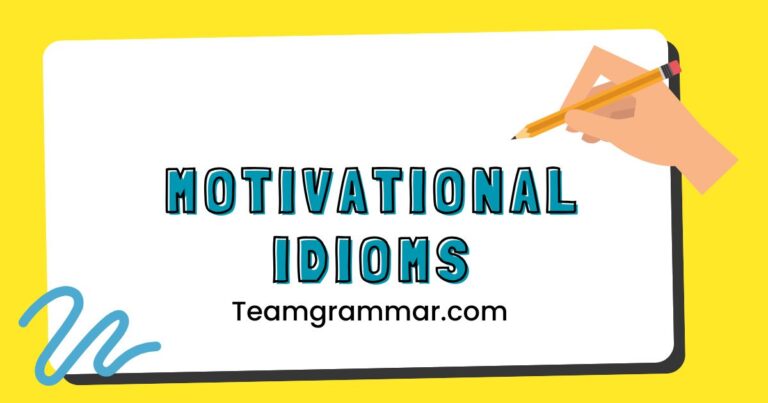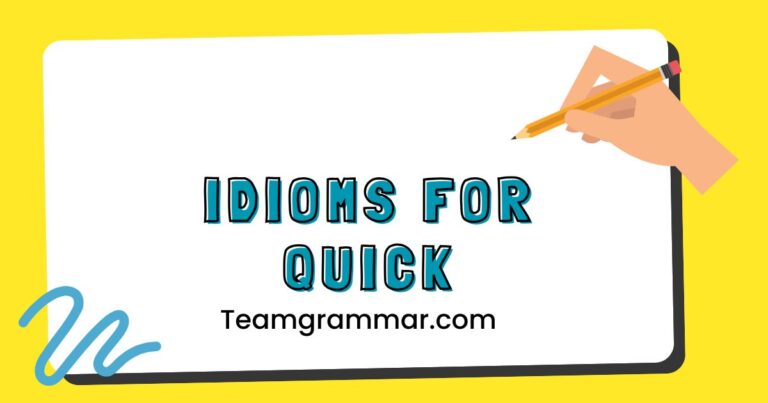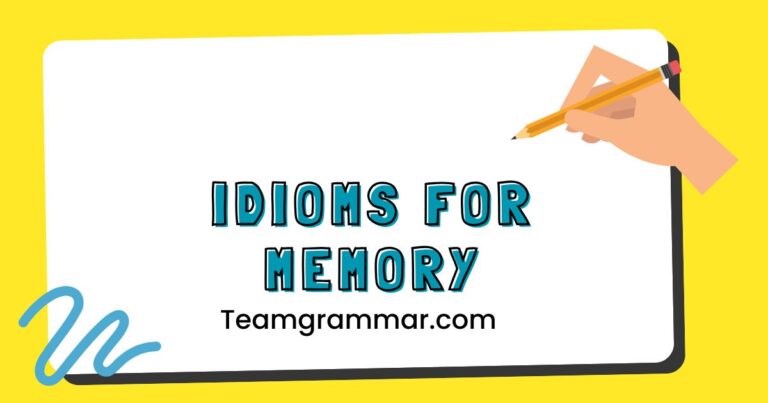33 Idioms for Important: Mastering English Expressions
Understanding idioms is crucial for mastering English because they add color and depth to everyday language. Knowing idioms related to the concept of “important” enhances communication skills, allowing for more nuanced and impactful expression.
This article is designed for English language learners of all levels, from beginners seeking to expand their vocabulary to advanced speakers aiming to refine their understanding of idiomatic expressions.
Table of Contents
- Introduction
- Definition of Idioms for “Important”
- Structural Breakdown of Idioms
- Types and Categories of Idioms for “Important”
- Examples of Idioms for “Important”
- Usage Rules for Idioms
- Common Mistakes When Using Idioms
- Practice Exercises
- Advanced Topics in Idioms
- Frequently Asked Questions
- Conclusion
Introduction
Idioms are a fascinating aspect of the English language, representing colorful and often metaphorical expressions that convey specific meanings. Mastering idioms is vital for achieving fluency and understanding native speakers.
This article focuses on idioms that express the concept of “important,” providing learners with the knowledge and practice needed to use these expressions effectively. By exploring various idioms, their meanings, and their proper usage, you will be able to enrich your vocabulary and enhance your overall communication skills.
This comprehensive guide is designed for English language learners of all levels. Whether you are a beginner just starting to explore idiomatic expressions or an advanced speaker looking to refine your understanding, this article offers valuable insights and practical exercises to help you master idioms for “important.” By the end of this article, you will be able to confidently use these idioms in your everyday conversations and writing.
Definition of Idioms for “Important”
An idiom is a phrase or expression whose meaning cannot be understood from the literal meanings of its individual words. Instead, the idiom has a figurative meaning known through common usage.
Idioms related to the concept of “important” are expressions that convey the significance, relevance, or necessity of something. These idioms often use metaphors, similes, and other figures of speech to emphasize the weight or value of the subject being described.
In essence, idioms for “important” are a shortcut to expressing the high value or critical nature of something without directly stating it. This can make communication more engaging and nuanced, but it also requires a good understanding of the cultural context and common usage to be interpreted correctly.
Recognizing these idioms is a crucial skill for understanding native English speakers and becoming fluent in the language.
Classification of Idioms
Idioms can be classified based on their structure and the figures of speech they employ. Some common classifications include:
- Metaphorical Idioms: These idioms use a metaphor to convey the meaning. For example, “a big deal” uses the metaphor of size to indicate importance.
- Similes: These idioms use “like” or “as” to compare two things, often to emphasize importance.
- Hyperbolic Idioms: These idioms use exaggeration to stress the importance of something.
- Fixed Idioms: These idioms have a rigid structure and cannot be altered without losing their meaning.
Function of Idioms
Idioms serve several functions in communication:
- Emphasis: They emphasize the importance or significance of something.
- Nuance: They add nuance and depth to communication, making it more engaging.
- Cultural Context: They reflect the cultural context in which they are used, providing insights into the values and beliefs of a community.
- Efficiency: They provide a concise way to express complex ideas.
Contexts of Use
Idioms for “important” can be used in various contexts, including:
- Formal Settings: While less common, some idioms can be used in formal settings to add emphasis.
- Informal Conversations: Idioms are frequently used in casual conversations to make communication more lively and engaging.
- Writing: Idioms can be used in creative writing, journalism, and even business writing to enhance the impact of the message.
- Presentations: Speakers often use idioms to connect with their audience and make their message more memorable.
Structural Breakdown of Idioms
Understanding the structure of idioms can help learners remember and use them correctly. While idioms, by definition, don’t follow standard grammatical rules, recognizing common patterns can be beneficial.
Many idioms consist of a combination of nouns, verbs, adjectives, and prepositions, often arranged in a way that deviates from typical sentence structure.
For example, the idiom “of great importance” follows a prepositional phrase structure, where “of” is followed by the noun phrase “great importance.” However, the meaning of the phrase is more than the sum of its parts. Similarly, the idiom “matter of life and death” uses a noun phrase to convey extreme importance.
Understanding these structural elements can aid in both comprehension and proper usage.
Common Idiomatic Patterns
Here are some common patterns found in idioms for “important”:
- “Of” + Noun Phrase: Of great importance, of significance, of consequence
- Noun + “of” + Noun: Matter of life and death, question of survival
- Verb + Adverb: Weigh heavily, figure largely
- Adjective + Noun: Crucial role, key factor, vital part
Implicit Rules in Idiom Construction
While idioms don’t adhere to strict grammatical rules, there are implicit rules to their construction:
- Fixed Word Order: The word order in an idiom is typically fixed and cannot be changed without altering the meaning or making the idiom nonsensical.
- Figurative Meaning: The meaning of the idiom is figurative, not literal.
- Cultural Context: Idioms are often tied to cultural contexts, and their meaning may not be immediately obvious to someone unfamiliar with the culture.
Types and Categories of Idioms for “Important”
Idioms for “important” can be categorized based on the degree of importance they convey or the specific context in which they are used. Some idioms suggest moderate importance, while others imply extreme urgency or significance.
Understanding these nuances can help you choose the most appropriate idiom for a given situation.
For example, an idiom like “a key factor” suggests that something is important but not necessarily critical, while “matter of life and death” indicates that something is of the utmost importance and urgency. This section will explore various categories of idioms for “important,” providing examples and explanations for each.
Idioms Expressing Critical Importance
These idioms convey that something is essential and cannot be ignored:
- Matter of life and death
- Of the essence
- Absolutely vital
- Paramount importance
- Critical to success
Idioms Expressing High Importance
These idioms indicate that something is very important and should be given significant attention:
- A big deal
- Of great significance
- Of considerable importance
- Carries weight
- Significant factor
Idioms Expressing Moderate Importance
These idioms suggest that something is important but not necessarily crucial:
- A key factor
- Plays a role
- Worth noting
- Of some importance
- Relevant to the issue
Idioms for Importance in Specific Contexts
Some idioms are specifically used in certain contexts, such as business, politics, or personal relationships:
- Business: Bottom line, game changer
- Politics: Hot-button issue, pivotal moment
- Personal Relationships: Heart of the matter, deal breaker
Examples of Idioms for “Important”
This section provides a comprehensive list of idioms for “important,” categorized for clarity and ease of understanding. Each idiom is accompanied by a definition and example sentences to illustrate its proper usage.
These examples will help you grasp the nuances of each idiom and learn how to incorporate them into your own communication.
The tables below are designed to provide a clear overview of each idiom, its meaning, and how it can be used in different contexts. By studying these examples, you will gain a better understanding of the range and versatility of idioms for “important.”
Table 1: Idioms Expressing Critical Importance
The following table lists idioms that express critical importance, indicating that something is essential and cannot be ignored.
| Idiom | Meaning | Example Sentence |
|---|---|---|
| Matter of life and death | Extremely important; a situation where someone could die | Getting medical attention immediately was a matter of life and death. |
| Of the essence | Absolutely necessary or vital | Timing is of the essence if we want to catch the early flight. |
| Absolutely vital | Completely necessary; essential | Water is absolutely vital for survival in the desert. |
| Paramount importance | Of the highest importance | Safety is of paramount importance in this construction site. |
| Critical to success | Essential for achieving a positive outcome | Teamwork is critical to success in this project. |
| A must | Something that is absolutely necessary or essential | Having a valid passport is a must for international travel. |
| Can’t afford to | Not being able to risk something | We can’t afford to make any mistakes in this final stage. |
| Imperative | Extremely important or urgent | It is imperative that we address this issue immediately. |
| Crucial | Extremely important or necessary | Having the right tools is crucial for completing the job efficiently. |
| Fundamental | Forming a necessary base or core; of central importance. | Honesty is fundamental to building trust in any relationship. |
| Indispensable | Absolutely necessary or essential. | A good map is indispensable when exploring new territories. |
| Of utmost importance | Of the greatest significance. | Maintaining confidentiality is of utmost importance in this profession. |
| A lynchpin | A vital person or thing holding an organization together. | She is the lynchpin of our team, without whom we would be lost. |
| Make-or-break | Capable of ensuring success or failure. | This deal is make-or-break for our company’s future. |
| Of vital importance | Extremely important and necessary. | Education is of vital importance for personal and societal development. |
| Non-negotiable | Not open to discussion or modification. | The deadline is non-negotiable; we must meet it at all costs. |
| A sine qua non | An essential condition; something absolutely necessary. | Patience is a sine qua non for teaching young children. |
| At all costs | Whatever it takes; no matter the difficulty or sacrifice. | We must protect our environment at all costs. |
| The be-all and end-all | The most important thing; the ultimate aim or purpose. | For him, winning the competition is the be-all and end-all. |
| Cannot be overstated | So important that it is impossible to emphasize it too much. | The importance of regular exercise cannot be overstated. |
| A touchstone | A standard or criterion by which something is judged or recognized. | Integrity is a touchstone of his character. |
| Of prime importance | Of the highest importance; essential. | The safety of our employees is of prime importance. |
Table 2: Idioms Expressing High Importance
This table presents idioms that express high importance, indicating that something is very important and should be given significant attention.
| Idiom | Meaning | Example Sentence |
|---|---|---|
| A big deal | Something important or significant | Getting into that university is a big deal for her. |
| Of great significance | Very important or noteworthy | The discovery of the new species is of great significance to science. |
| Of considerable importance | Quite important or significant | His contributions to the field are of considerable importance. |
| Carries weight | Has influence or importance | His opinion carries weight in the company. |
| Significant factor | An important element or influence | Economic growth is a significant factor in improving living standards. |
| Major league | Very important or of high quality | She’s a major league player in the industry. |
| High priority | Something that needs to be dealt with before other things | The safety of our students is a high priority. |
| Front and center | In a prominent or important position | Customer satisfaction should be front and center in our business strategy. |
| A cornerstone | An essential part of something | Education is a cornerstone of a successful society. |
| A guiding principle | A fundamental rule or value that guides actions | Honesty is a guiding principle in our company’s ethics. |
| A linchpin | A person or thing vital to an enterprise or organization | He is the linchpin of the team, holding everything together. |
| On the front burner | Given top priority | This project is on the front burner and needs immediate attention. |
| A focal point | The center of interest or activity | The new museum is a focal point for cultural events in the city. |
| Of moment | Important or significant | The decision we make today is of moment for our future. |
| A key element | An essential part of something | Communication is a key element in building strong relationships. |
| A vital cog | An important part of a larger system or organization | Each employee is a vital cog in the machine of our company. |
| A significant stride | An important step forward | The new policy represents a significant stride towards equality. |
| A big step | An important action or decision | Moving to a new city was a big step for her career. |
| Of primary concern | The main issue or concern | The health of our children is of primary concern to us. |
| Pivotal | Critically important. | The next game is pivotal for the team’s playoff chances. |
| Of great consequence | Having significant results or effects. | The decisions made today are of great consequence for future generations. |
Table 3: Idioms Expressing Moderate Importance
This table lists idioms that express moderate importance, suggesting that something is important but not necessarily crucial.
| Idiom | Meaning | Example Sentence |
|---|---|---|
| A key factor | An important element that contributes to a result | Education is a key factor in reducing poverty. |
| Plays a role | Has an effect or influence | Exercise plays a role in maintaining good health. |
| Worth noting | Important enough to be mentioned | It’s worth noting that the company’s profits have increased this year. |
| Of some importance | Somewhat important | The meeting is of some importance, so please attend. |
| Relevant to the issue | Connected to the matter being discussed | Your experience is relevant to the issue at hand. |
| In the mix | Being considered as a possibility or factor | Her skills are definitely in the mix when we consider candidates. |
| Worth considering | Deserving of thought or attention | His proposal is worth considering before making a decision. |
| Bear in mind | Remember or take into account | Bear in mind that the deadline is approaching quickly. |
| Keep in view | Remember or consider something | We must keep in view the long-term goals of the project. |
| Of note | Worthy of attention | The author’s latest book is of note for its innovative style. |
| Not to be sneezed at | Not to be dismissed or underestimated | The salary offered is not to be sneezed at. |
| Something to consider | An aspect that should be thought about | The environmental impact is something to consider. |
| A point to remember | An aspect that should be kept in mind | The need for regular breaks is a point to remember. |
| A factor | Something that contributes to a result or outcome | Weather is a factor in the success of the event. |
| Of significance | Important or noteworthy | The findings of the study are of significance to researchers. |
| A part to play | A role or contribution | Everyone has a part to play in achieving our goals. |
| A piece of the puzzle | A contributing element | Each clue is a piece of the puzzle in solving the mystery. |
| Comes into play | Has an effect or becomes relevant | Experience comes into play when making important decisions. |
| Worthy of attention | Deserving of notice or consideration | The artist’s work is worthy of attention for its unique style. |
| Substantial | Of considerable importance, size, or worth. | The company made a substantial contribution to the charity. |
| Not inconsequential | Having some degree of importance. | His advice was not inconsequential; it helped us make a better decision. |
Usage Rules for Idioms
Using idioms correctly requires understanding their specific meanings and the contexts in which they are appropriate. While idioms can add color and depth to your communication, using them incorrectly can lead to confusion or misinterpretation.
This section outlines the key rules for using idioms effectively.
It’s important to note that idioms often have a fixed structure and cannot be altered without losing their meaning. Additionally, idioms are often tied to cultural contexts, and their meaning may not be immediately obvious to someone unfamiliar with the culture.
Therefore, it’s crucial to learn the proper usage of each idiom and practice using them in different situations.
Maintain Fixed Structure
Idioms generally have a fixed structure, and changing the word order or substituting words can alter their meaning or make them nonsensical. For example, “matter of life and death” cannot be changed to “life and death matter” without losing its idiomatic meaning.
Consider Contextual Appropriateness
Some idioms are more appropriate in formal settings, while others are better suited for informal conversations. Consider your audience and the overall tone of the communication when choosing an idiom.
For example, “a big deal” is more appropriate in casual conversation than in a formal presentation.
Avoid Overuse
While idioms can enhance communication, overuse can make your language sound unnatural or forced. Use idioms sparingly and only when they add value to your message.
Understand the Meaning
Ensure you fully understand the meaning of an idiom before using it. Using an idiom incorrectly can lead to confusion or misinterpretation.
If you’re unsure of the meaning, look it up in a dictionary or ask a native speaker.
Practice Cultural Sensitivity
Be aware that some idioms may have different meanings or connotations in different cultures. Avoid using idioms that may be offensive or insensitive to your audience.
Common Mistakes When Using Idioms
Even advanced English learners sometimes make mistakes when using idioms. These mistakes often stem from a misunderstanding of the idiom’s meaning, its proper structure, or the context in which it is appropriate.
This section highlights some common mistakes and provides correct examples to help you avoid these errors.
By understanding these common pitfalls, you can improve your accuracy and confidence when using idioms. Pay close attention to the correct usage and practice incorporating idioms into your communication to reinforce your understanding.
Incorrect vs. Correct Examples
The table below provides examples of common mistakes when using idioms for “important,” along with the correct usage.
| Incorrect | Correct | Explanation |
|---|---|---|
| It’s a big dealness. | It’s a big deal. | Idioms have a fixed structure and cannot be altered. |
| The timing is of the essence-ness. | The timing is of the essence. | Adding suffixes to idioms is incorrect. |
| The matter of death and life. | The matter of life and death. | The word order in idioms is fixed. |
| It plays a big role in success. | It plays a role in success. | Avoid adding unnecessary words to idioms. |
| Water is absolutely vitalness. | Water is absolutely vital. | Do not add suffixes to idioms. |
| The key factor is the important thing. | The key factor is education. | Avoid redundancy by rephrasing the sentence to include the key factor. |
| That’s very matter of life and death. | That’s a matter of life and death. | Using the correct article (“a”) is essential for the idiom to make sense. |
| He is playing a big role. | He is playing a role. | The adjective “big” is unnecessary and alters the meaning of the idiom. |
| It’s the essence of all things. | It’s of the essence. | Adding extra words can dilute the original meaning of the idiom. |
| That is a crucial important thing. | That is crucial. | Avoid using both “crucial” and “important” as they convey similar meanings. |
Practice Exercises
To solidify your understanding of idioms for “important,” this section provides a series of practice exercises. These exercises will test your knowledge of idiom meanings, usage, and contextual appropriateness.
Each exercise includes a set of questions and corresponding answers to help you assess your progress.
By completing these exercises, you will gain confidence in your ability to use idioms effectively and accurately. Remember to review the definitions and examples provided earlier in this article if you encounter any difficulties.
Consistent practice is key to mastering idioms and integrating them into your everyday communication.
Exercise 1: Fill in the Blanks
Complete the following sentences with the appropriate idiom from the list below.
Idiom List: a big deal, of the essence, plays a role, matter of life and death, key factor
| Question | Answer |
|---|---|
| Getting this contract is ____ for our company’s future. | a big deal |
| In emergency situations, timing is ____. | of the essence |
| Exercise ____ in maintaining good health. | plays a role |
| For the injured hiker, getting medical attention was a ____. | matter of life and death |
| Hard work is a ____ in achieving success. | key factor |
Exercise 2: Multiple Choice
Choose the correct meaning of the following idioms.
| Question | Options | Answer |
|---|---|---|
| “Of great significance” means: | a) Not important, b) Very important, c) Slightly important | b) Very important |
| “Carries weight” means: | a) Is heavy, b) Has influence, c) Is unimportant | b) Has influence |
| “Absolutely vital” means: | a) Not necessary, b) Somewhat important, c) Completely necessary | c) Completely necessary |
| “Worth noting” means: | a) Not important, b) Important enough to mention, c) Insignificant | b) Important enough to mention |
| “Critical to success” means: | a) Unimportant for success, b) Essential for success, c) Irrelevant | b) Essential for success |
Exercise 3: Sentence Completion
Complete the sentences using the idioms listed below in the correct context.
Idioms: front and center, worth considering, non-negotiable, indispensable, at all costs
| Question | Answer |
|---|---|
| Customer satisfaction should be ____ in our business strategy. | front and center |
| The environmental impact is ____ before making a new policy. | worth considering |
| The deadline is ____; we must meet it. | non-negotiable |
| A good map is ____ when exploring new territories. | indispensable |
| We must protect our natural resources ____. | at all costs |
Advanced Topics in Idioms
For advanced learners, understanding the nuances of idioms goes beyond simple definitions and usage. This section delves into more complex aspects of idioms, including their historical origins, cultural variations, and stylistic implications.
By exploring these advanced topics, you can gain a deeper appreciation for the richness and complexity of idiomatic expressions.
Understanding the historical context of idioms can provide insights into their meanings and usage. Many idioms have evolved over time, and their original meanings may differ from their current interpretations.
Additionally, idioms can vary across different cultures and dialects, reflecting the unique experiences and perspectives of different communities.
Historical Origins of Idioms
Many idioms have fascinating historical origins, often rooted in specific events, customs, or cultural practices. Understanding these origins can shed light on the meaning and usage of the idiom.
Cultural Variations in Idioms
Idioms can vary significantly across different cultures and dialects. What is a common idiom in one culture may be unfamiliar or have a different meaning in another.
Stylistic Implications of Idioms
The use of idioms can have stylistic implications, affecting the tone, register, and overall impact of your communication. Consider the stylistic effect you want to achieve when choosing an idiom.
Frequently Asked Questions
This section addresses some frequently asked questions about idioms for “important.” These questions cover common concerns and challenges faced by English language learners. By providing clear and concise answers, this section aims to enhance your understanding and confidence in using idioms.
If you have additional questions or need further clarification, consult a dictionary, grammar guide, or native English speaker for assistance. Continuous learning and practice are essential for mastering idioms and improving your overall communication skills.
- What is an idiom?
An idiom is a phrase or expression whose meaning cannot be understood from the literal meanings of its individual words. Instead, the idiom has a figurative meaning known through common usage.
- Why is it important to learn idioms?
Learning idioms is important because they add color and depth to everyday language. Understanding idioms enhances communication skills and allows you to understand native speakers better.
- How can I learn idioms effectively?
You can learn idioms effectively by studying lists of common idioms, reading examples of their usage, and practicing using them in your own communication. It’s also helpful to consult dictionaries and grammar guides for clarification.
- Are idioms the same in all English-speaking countries?
No, idioms can vary across different English-speaking countries and dialects. Some idioms may be more common in certain regions than others.
- Can I change the words in an idiom?
Generally, no. Idioms have a fixed structure, and changing the words can alter their meaning or make them nonsensical.
- How can I tell if a phrase is an idiom?
You can tell if a phrase is an idiom if its meaning cannot be understood from the literal meanings of its individual words. Additionally, idioms often have a figurative or metaphorical meaning.
- Is it okay to use idioms in formal writing?
It depends on the context. Some idioms are appropriate in formal writing, while others are better suited for informal communication. Consider your audience and the overall tone of the writing when choosing an idiom.
- What should I do if I don’t understand an idiom?
If you don’t understand an idiom, look it up in a dictionary or ask a native speaker for clarification. Understanding the context in which the idiom is used can also help you decipher its meaning.
- How often should I use idioms in my writing or speech?
Use idioms sparingly and only when they add value to your message. Overusing idioms can make your language sound unnatural or forced.
- Are there any online resources for learning idioms?
Yes, there are many online resources for learning idioms, including dictionaries, grammar guides, and language learning websites. These resources can provide definitions, examples, and practice exercises to help you master idioms.
Conclusion
Mastering idioms related to “important” is a valuable skill for English language learners. Idioms add depth and nuance to communication, allowing for more expressive and impactful interactions.
By understanding the definitions, usage rules, and common mistakes associated with these idioms, you can enhance your fluency and confidence in English.
Remember to practice using idioms regularly and consult reliable resources for clarification when needed. Continuous learning and consistent effort are essential for mastering idioms and integrating them into your everyday communication.
With dedication and perseverance, you can become proficient in using idioms and enrich your overall English language skills.







